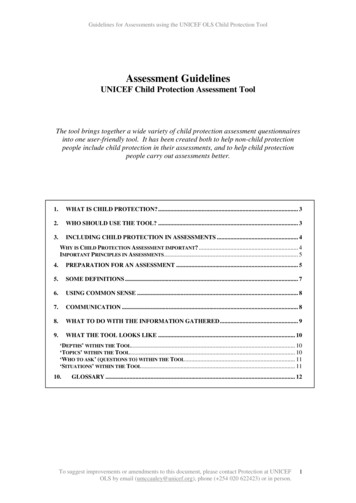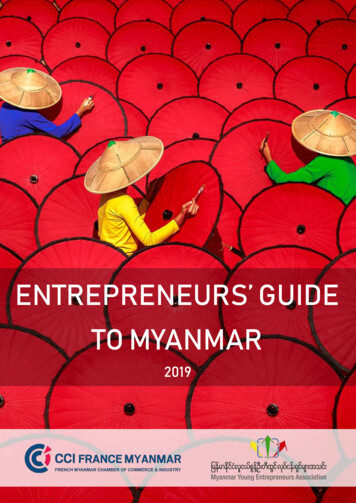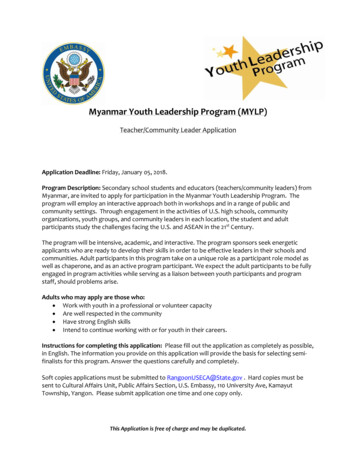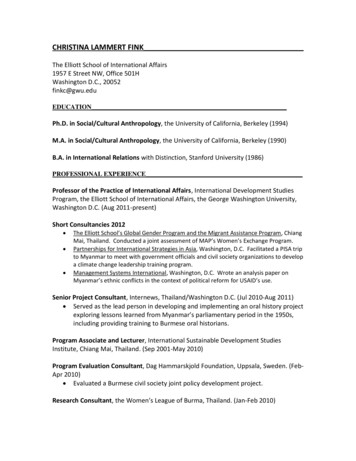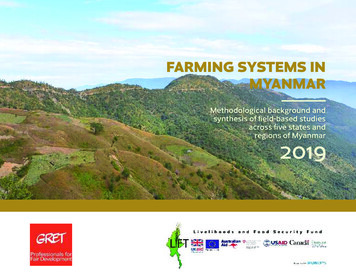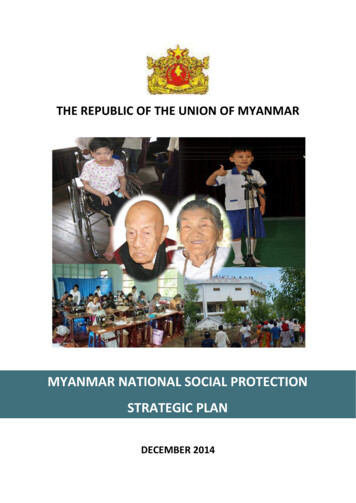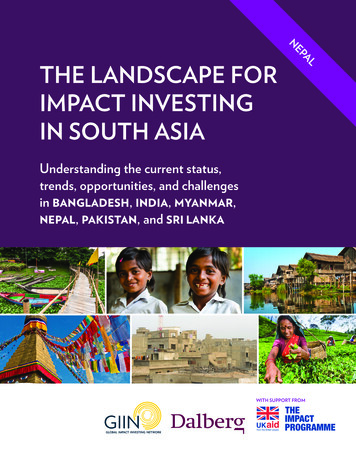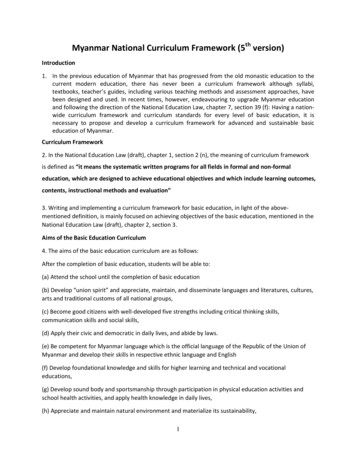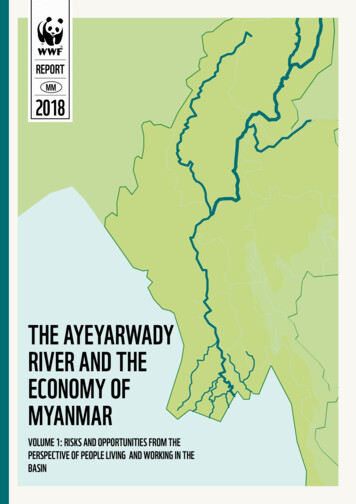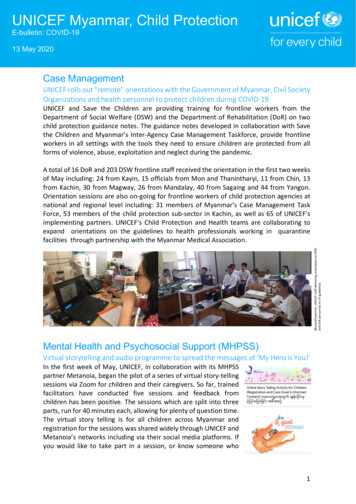
Transcription
UNICEF Myanmar, Child ProtectionE-bulletin: COVID-1913 May 2020Case ManagementUNICEF rolls out “remote” orientations with the Government of Myanmar, Civil SocietyOrganizations and health personnel to protect children during COVID-19UNICEF and Save the Children are providing training for frontline workers from theDepartment of Social Welfare (DSW) and the Department of Rehabilitation (DoR) on twochild protection guidance notes. The guidance notes developed in collaboration with Savethe Children and Myanmar’s Inter-Agency Case Management Taskforce, provide frontlineworkers in all settings with the tools they need to ensure children are protected from allforms of violence, abuse, exploitation and neglect during the pandemic.@unicefmyanmar UNICEF staff delivering orientation to DSWand DoR personnel on CP guidelinesA total of 16 DoR and 203 DSW frontline staff received the orientation in the first two weeksof May including: 24 from Kayin, 15 officials from Mon and Thanintharyi, 11 from Chin, 13from Kachin, 30 from Magway, 26 from Mandalay, 40 from Sagaing and 44 from Yangon.Orientation sessions are also on-going for frontline workers of child protection agencies atnational and regional level including: 31 members of Myanmar’s Case Management TaskForce, 53 members of the child protection sub-sector in Kachin, as well as 65 of UNICEF’simplementing partners. UNICEF’s Child Protection and Health teams are collaborating toexpand orientations on the guidelines to health professionals working in quarantinefacilities through partnership with the Myanmar Medical Association.Mental Health and Psychosocial Support (MHPSS)Virtual storytelling and audio programme to spread the messages of ‘My Hero is You!’In the first week of May, UNICEF, in collaboration with its MHPSSpartner Metanoia, began the pilot of a series of virtual story-tellingsessions via Zoom for children and their caregivers. So far, trainedfacilitators have conducted five sessions and feedback fromchildren has been positive. The sessions which are split into threeparts, run for 40 minutes each, allowing for plenty of question time.The virtual story telling is for all children across Myanmar andregistration for the sessions was shared widely through UNICEF andMetanoia’s networks including via their social media platforms. Ifyou would like to take part in a session, or know someone who1
would, you can register here. This initiative is funded by USAID and the Government of Japan.@unicefmyanmar Children recording audio forMy Hero is You! in MyanmarIn addition, a child-friendly audio version of the story is currently in production. The scripthas been modified for the Myanmar context and six children have come on board to play thedifferent characters of the story. The final audio version will be broadcast nationwidethrough Myanmar Radio Station. The story inspires every child to become a hero in the fightagainst COVID-19 by taking an active role in sharing information on preventing the spread ofcoronavirus. The story is currently available in both Myanmar and Rohingya languages andboth versions can be found on the UNICEF website.A Myanmar colouring book provides COVID-19 messages for children and adds toUNICEF’s growing MHPSS packageChildren in Myanmar are impacted in different ways by COVID-19, whether they are stayingin a quarantine centre, or learning to live with new social distancing measures at home. Tosupport and stimulate children during this time, UNICEFis working on a set of activities that make up a MHPSSpackage. Adding to this package is a Myanmar colouringbook which has been developed in collaborationbetween Myanmar’s Child Protection Working Group,Triangle, Raiki Community Development Foundation andUNICEF. The book provides an opportunity for childrento learn about COVID-19 and how to protect themselvesagainst the virus, at the same time as having fun,colouring in. Over 10,000 copies of the book arecurrently being printed, to be dispatched across thecountry, you can view the book online here.Recreation kits “re-designed” to be COVID-19 safe for childrenUNICEF and its partners have reviewed and redesigned the existing Child Friendly Space (CFS)Recreation Kit with the aim of making it COVID-19 responsive. Recreational activities in CFSare typically in groups, with little consideration for social distancing. These kits are forchildren who have been affected by COVID-19 in all settings and the activities are favourablefor children to play on their own, or with only one or two other people. The kits contain 20items including: drawing books, colouring pens and paper, Lego, Snakes and Ladder, puzzlesand other games. The procurement of 5,000 kits is underway and will be distributed toUNICEF offices in Chin, Kachin, Mandalay, Rakhine, the South-East, Shan and Yangon. TheseCOVID-19 sensitive recreation kits for children have been supported the Government ofDenmark.2
Parenting TipsDuring COVID-19, children and their parents are adapting to the “new normal”, with schoolclosures, working remotely and physical distancing. UNICEF at the global level teamed upwith the Parenting for Lifelong Health initiative to bringparents and caregivers a set of handy tips to navigatethrough the challenges of day to day life. UNICEF Myanmar’sChild Protection and Education Programmes havetranslated all 12 tips into Myanmar language: Talking aboutCOVID-19; One-on-one time; Keeping it positive; Getstructured; Learning through play; Keeping children safeonline; Family harmony at home; Keep calm and managestress; Bad behaviour; When we get angry; Family budgetingin times of financial stress; Parenting in crowded homes andcommunities. The first five parenting tips are available inMyanmar language and other languages on Parenting forLifelong Health’s website and the Myanmar translation ofthe whole set of 12 tips can be accessed on UNICEF’swebsite.Support for Vulnerable GroupsMigrant workers return from China to Kachin State in Myanmar’s NorthCOVID-19 IEC materials create behaviour change inNon-state actor (NSA) controlled area of Kayin stateUNICEF in collaboration with its implementing partnerKaruna Mission Social Solidarity (KMSS) has providedCOVID-19 information, education and communication (IEC)materials to an NSA controlled area of Kayin State.Kyainseikgyi Township, had previously received limitedinformation about the pandemic and few preparednessmeasures were in place. COVID-19 awareness raisingmaterials including child-friendly handwashing and socialdistancing messages have now been translated into twoethic languages, Pao and Sakaw and distributed across thePhoto credit @KMSS. Youth in Kyainseikgyi Township washing his hands at awater station with UNICEF IEC materials on itHistorical migration trends show Myanmar migrants from Kachin State crossing the borderinto neighbouring China in search of work and higher wages. Now however, up to 18,000migrant workers are expected to return to Kachin from China, with an estimated 3,800already having returned between 22 March and 29 April. So far, UNICEF has received reportsof over 600 children staying in quarantine facilities in the state, many of them with theirfamilies. There are however, a handful of children who were temporarily separated fromtheir caregivers. One migrant worker, a mother of three, has recently returned from Chinaand is staying in a quarantine facility in the state’s border region. Her children however, wereliving in an IDP camp in Hpakant township on their own. UNICEF, through its partner KachinBaptist Convention (KBC), has provided support to the three children and arranged for themto stay with their uncle while awaing for their mother to return home. With the help of campvolunteers, the children have kept in contact with their mother over the phone while she hasbeen in quarantine.3
township. KMSS community-based workers reported that they have seen an increase inunderstanding of how to prevent the spread of COVID-19 among community members, asthey have developed innovative ways to protect themselves against the virus, includingfitting entrances to homes with makeshift water dispensers and soap for guests to use beforeentering. Through coordination with village leaders, KMSS has provided IEC materials to 410households across the six villages of Kyainseikgyi Township.Children and Armed ConflictArmed conflict continues to impact the lives of childrenConflict in Rakhine and Chin States between the Myanmar Armed Forces and the ArakanArmy has continued unabated during the COVID-19 pandemic. These two states have beenovertly excluded from the unilateral ceasefire declared by Myanmar Armed Forces from May10 to August 31. The intensifying fighting has taken a high toll on civilians including children,who are being caught in crossfire and killed or injured by landmines and other explosiveremnants of war. The erosion of the protection of civilians has been of particular concern, asconflict comes amidst a reduction of humanitarian actors on the ground due to COVID19. UNICEF’s Mine Action in Myanmar Factsheet for quarter one of 2020, echoes thisalarming trend. Figures show the number of victims countrywide reaching more than 40% ofthe total annual cases for the entire year of 2019. The most notable increase is in RakhineState which accounts for nearly 60% of those first quarter cases, an increase of 25% whencompared with 2019 figures. With most group awareness raising activities on ExplosiveOrdinance Risk Education (EORE) suspended due to the pandemic, alternative ways todisseminate EORE messages through local radio, pamphlets and mobile applications arebeing explored. UNICEF’s mine action work in Myanmar is supported by USAID and theGovernment of Japan.Monitoring and reporting of grave violations against childrenUNICEF continues to support local monitors and community-based “eyes and ears” tooperate the Monitoring and Reporting Mechanism (MRM) on grave violations againstchildren. COVID-19 pandemic control measures have affected many of those MRMmonitors. In order to gain an accurate picture of the capacities on the ground, UNICEF,through its MRM partner, has reached out to 366 trained monitors in conflict affected areas,to determine whether they remain active and to receive an update on the situation in theirarea of coverage. Although the pandemic control measures and associated movementrestrictions have affected many of the monitors, the vast majority of the 242 that could bereached, reported receiving and sharing information on grave violations through the use ofmessenger applications, and phone calls and texts in areas where internet is shut down.Monitors confirmed the escalation of conflict in Rakhine and Chin States but did not reporta surge of recruitment and use in Kachin State which was feared due to the return of migrantworkers from China. UNICEF and its partner are now attempting to contact those monitorsthat couldn’t be reached initially. An online training for new monitors as well as a refreshertraining is currently being finalised and will be delivered widely to maintain the network ofactive monitors and pass on key information on MRM. The work of the monitoring andreporting of grave violations has been supported by USAID.4
Child JusticeRelease from detentionAt least 303 children, including 118 charged under immigration laws and 115 charged withdrug related offences, were released from Department of Social Welfare operated trainingschools across the country on 17 April. These children were sent back to their state of originwhich for the majority of them, was Rakhine State. UNICEF in Rakhine has been workingclosely with implementing partners to support those children and their parents. Childrenhave been returned to the norther and central areas of the state by the government ofMyanmar since mid-April. These children have been staying in quarantine facilities acrossthe state and have now been released and reunited with their families. On 11 May inMaungdaw and Buthidaung Townships, 113 children were released and have now beenreunified with their families or caregivers. Family tracing and reunification, mobilepsychosocial support, messaging on COVID-19 and child protection supplies were providedto those children as part of the case management services offered by UNICEF’s implementingpartners, Community and Family Services International (CFSI) in Northern Rakhine and Savethe Children in Central Rakhine as well as Child Protection Working Group partners DanishRefugee Council and Plan International.Diversion measures for children in breach of curfewTo prevent the spread of COVID-19 and ensure social distancing practices are adhered to,curfew orders have been put in place across the country. UNICEF is regularly advocating tothe Government of Myanmar at both the national and regional level, to ensure alignmentwith Myanmar’s new Child Rights Law and the UN Convention on the Rights of the Childwhich outline the prevention of detention and the use of alternatives for children in contactwith the law. Last week in Kayin State where curfew orders have been in place since 18 April,23 children were apprehended for violating curfew. Instead of being detained, the childrenwere subject to alternative measures in the form of community service. All children werelater released to their parents. As of now, there are no reports of children in detention dueto curfew violations.Prevention of Sexual Exploitation and AbuseBetween 5 and 11 May, UNICEF in close collaboration with the PSEA Inter-agency Networkhave trained 150 government officials from the Department of Social Welfare and theDepartment of Rehabilitation who are involved in COVID-19 response in States and Regions.Officials are largely from South East Region where over 30,000 migrant returnees fromThailand have been quarantined. This online Zoom training initiative will continue until theend of May.For more information contact:Noriko Izumi, Chief Child ProtectionEmail: nizumi@unicef.org5
The virtual story telling is for all children across Myanmar and registration for the sessions was shared widely through UNICEF and Metanoia's networks including via their social media platforms. If you would like to take part in a session, or know someone who UNICEF Myanmar, Child Protection E-bulletin: COVID-19 13 May 2020 _ r D l s
